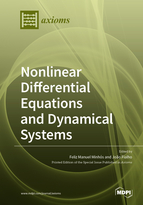Nonlinear Differential Equations and Dynamical Systems: Theory and Applications
A special issue of Axioms (ISSN 2075-1680). This special issue belongs to the section "Mathematical Analysis".
Deadline for manuscript submissions: closed (30 September 2020) | Viewed by 27994
Special Issue Editors
2. Center for Research in Mathematics and Applications (CIMA), Institute for Advanced Studies and Research (IIFA), University of Évora, Rua Romão Ramalho, 59, 7000-671 Évora, Portugal
Interests: differential and difference equations; dynamical systems; boundary value problems; topological and variational methods; fractional calculus; differential and integral equations
Special Issues, Collections and Topics in MDPI journals
Interests: mathematical modelling; differential equations; BVP
Special Issues, Collections and Topics in MDPI journals
Special Issue Information
Dear Colleagues,
Nonlinear differential equations, dynamical systems, and related topics are particularly trendy topics at present, as they have had wide and significant applications in many fields of Physics, Chemistry, Engineering, Biology or even Economics, in general, and Mathematics, in particular.
In addition, they can be approached using several different methods and techniques. As examples, we can refer to variational and topological methods, fixed point theory, initial and boundary value problems, continuous and discrete dynamical systems, qualitative theory, stability theory, the existence and control of chaos, and the existence of attractors and periodic orbits, among others.
In this Special Issue we propose to collect some state-of-the-art results that can contribute effectively to these areas.
Before submission authors should carefully read over the journal's instructions for Authors, in https://www.mdpi.com/journal/axioms/instructions
Prof. Dr. Feliz Manuel Minhós
Prof. Dr. João Fialho
Guest Editors
Manuscript Submission Information
Manuscripts should be submitted online at www.mdpi.com by registering and logging in to this website. Once you are registered, click here to go to the submission form. Manuscripts can be submitted until the deadline. All submissions that pass pre-check are peer-reviewed. Accepted papers will be published continuously in the journal (as soon as accepted) and will be listed together on the special issue website. Research articles, review articles as well as short communications are invited. For planned papers, a title and short abstract (about 100 words) can be sent to the Editorial Office for announcement on this website.
Submitted manuscripts should not have been published previously, nor be under consideration for publication elsewhere (except conference proceedings papers). All manuscripts are thoroughly refereed through a single-blind peer-review process. A guide for authors and other relevant information for submission of manuscripts is available on the Instructions for Authors page. Axioms is an international peer-reviewed open access monthly journal published by MDPI.
Please visit the Instructions for Authors page before submitting a manuscript. The Article Processing Charge (APC) for publication in this open access journal is 2400 CHF (Swiss Francs). Submitted papers should be well formatted and use good English. Authors may use MDPI's English editing service prior to publication or during author revisions.
Keywords
- Nonlinear differential and integral equations
- Initial and boundary value problems
- Fractional calculus and applications
- Variational and topological methods
- Qualitative, asymptotic and oscillation properties
- Fixed point theory
- Continuous and discrete dynamical systems
- Stability theory
- Chaos theory and chaos control
- Existence of periodic orbits and attractors
- Applications to real world phenomena
Benefits of Publishing in a Special Issue
- Ease of navigation: Grouping papers by topic helps scholars navigate broad scope journals more efficiently.
- Greater discoverability: Special Issues support the reach and impact of scientific research. Articles in Special Issues are more discoverable and cited more frequently.
- Expansion of research network: Special Issues facilitate connections among authors, fostering scientific collaborations.
- External promotion: Articles in Special Issues are often promoted through the journal's social media, increasing their visibility.
- e-Book format: Special Issues with more than 10 articles can be published as dedicated e-books, ensuring wide and rapid dissemination.
Further information on MDPI's Special Issue polices can be found here.
Related Special Issues
- New Trends in Differential and Difference Equations and Applications in Axioms (10 articles)
- Advances in Nonlinear Boundary Value Problems: Theory and Applications in Axioms (9 articles)
- Differential Equations and Dynamical Systems in Axioms (2 articles)






